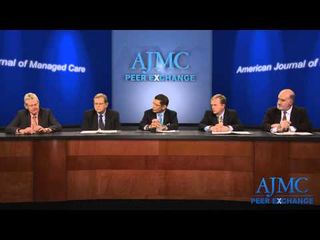
Oncology
Latest News
Latest Videos
More News

The Biosimilars Council wants CMS to hold back on Medicare Part B reimbursement for biosimilars.

An article published in the Journal of Clinical Oncology finds that survivorship care plans may not greatly improve patient satisfaction with their care.

The deadly nature of colorectal cancer merited attention in the Affordable Care Act, which called for eliminating cost-sharing for screening to prevent deaths. The future of colorectal screening, its cost-effectiveness, and a possible way to limit unneeded tests are the topic of a recent series of papers in The American Journal of Managed Care.

A trigger built in patient EHRs can avoid follow-up delays in those at risk for developing certain types of cancers, a JCO study shows.

Aetna and the University of Chicago Medicine kicked off a value-based oncology medical home model in July this year in an effort to transition from fee-for-service to value-based care.

The National Comprehensive Cancer Network has announced the development of another "price" calculator that will help stakeholders assess the relative "value" of available options.

The study published in Science Translational Medicine found that tissue stiffening in the breasts of obese women can drive the development of malignant disease.

There are many cost-related pieces in the grand picture of care that are devastating to families and patients, including copayments, hospital visit bills, transportation fees, and drug prices.

Conducted by researchers at the Memorial Sloan Kettering Cancer Center, phase 2 results from a basket trial evaluated the efficacy of vemurafenib on nonmelanoma BRaf V600-mutated cancers in 122 patients across 23 global centers.

Colorectal cancer screening involves balancing immediate harms with longer-term benefits; electronic medical record decision support may facilitate personalized benefit/harm assessment.

This supplement summarizes proceedings from the AJMC Oncology Stakeholders Summit, Spring 2015 series, at which experts gathered to discuss the evolving treatment landscape in oncology and the development of innovative payment models to help reduce the cost of care without sacrificing quality of care.

New resources are being directed toward precision medicine, particularly in cancer care. With that in mind, Evidence-Based Oncology, a publication of The American Journal of Managed Care, devotes its current issue to articles and commentaries on this growing field.

Evidence provided by a study published in The Lancet Oncology affirms that oral contraceptives provide long-term protection against endometrial cancer.


An article published in JAMA Oncology underscores the need for efforts to improve quality of life for cancer patients.

Analysis of results from the CHAARTED trial, published in the New England Journal of Medicine, has found that 6 cycles of chemotherapy (docetaxel) before androgen-deprivation therapy early in the treatment of metastatic prostate cancer significantly improved overall survival than treatment with ADT alone.


A multicollaborative study conducted for the National Cancer Institute has resulted in a tool called the Common Terminology Criteria for Adverse Events (PRO-CTCAE). PRO-CTCAE can help integrate the patient perspective into adverse event reporting.

The Diagnosis for Diagnostics: Changes to Medicare Payment and Coverage of Clinical Laboratory Tests
The basis for determining Medicare payment rates for clinical diagnostic laboratory tests is changing. These changes will be important for all payers and providers to follow for future reimbursement and contract negotiations.

A panel of healthcare experts invited by The American Journal of Managed Care participated in the Oncology Stakeholders Summit, Spring 2015 Peer Exchange, to discuss 340B and other issues in oncology care.

A study published in the Journal of the American Geriatrics Society found that older women with breast cancer have a poor response to chemotherapy, while older patients with advanced colon cancer (both men and women) did well.

Precision medicine will perhaps establish some of the most important biomedical innovations of our generation. However, for that future to become a reality, we have to create an access and reimbursement environment that is conducive to precision care.

Evidence-Based Oncology spoke with Mark Capone about the challenges and opportunities in molecular diagnostics, and what's ahead at Myriad Genetics.

In his editorial piece, Joseph Alvarnas, MD, narrates the importance of precision medicine in oncology care.

Research published in the Journal of Oncology Practice found that factors unrelated to the individual patient accounted for the majority of variation in the cost of radiation therapy for breast, prostate, and lung cancer patients.















